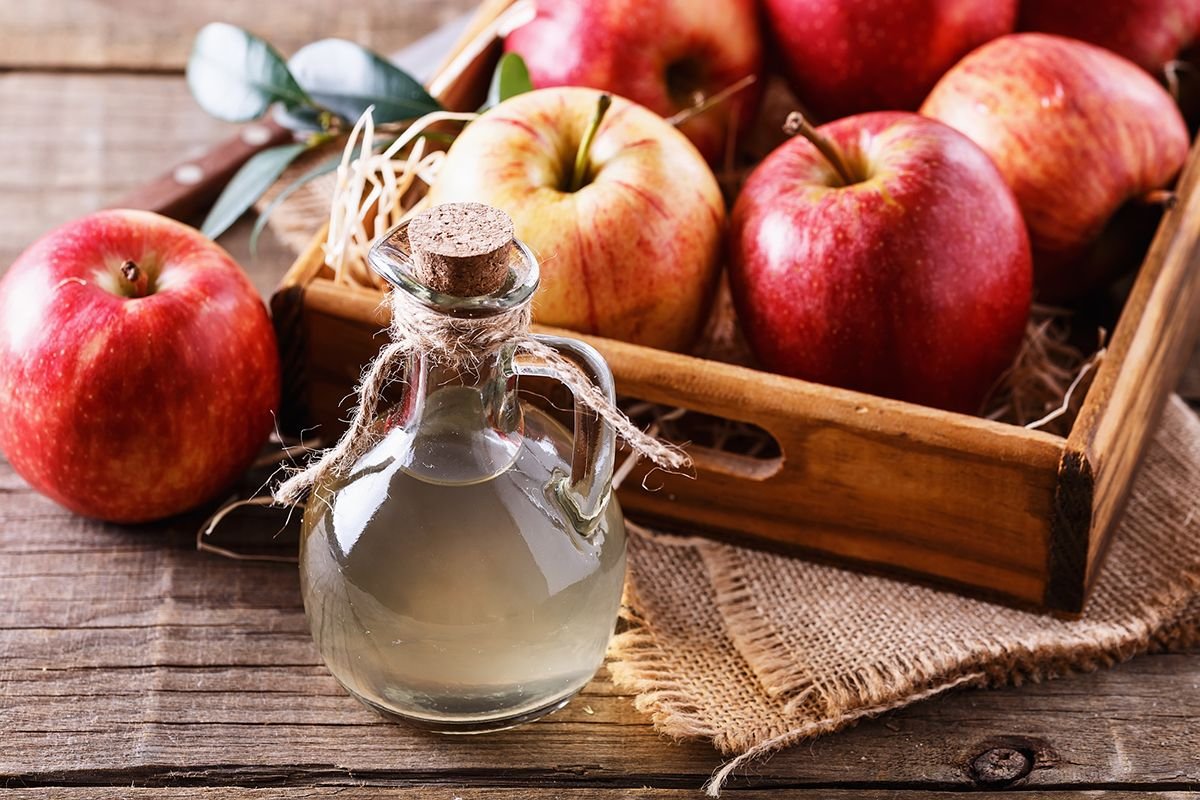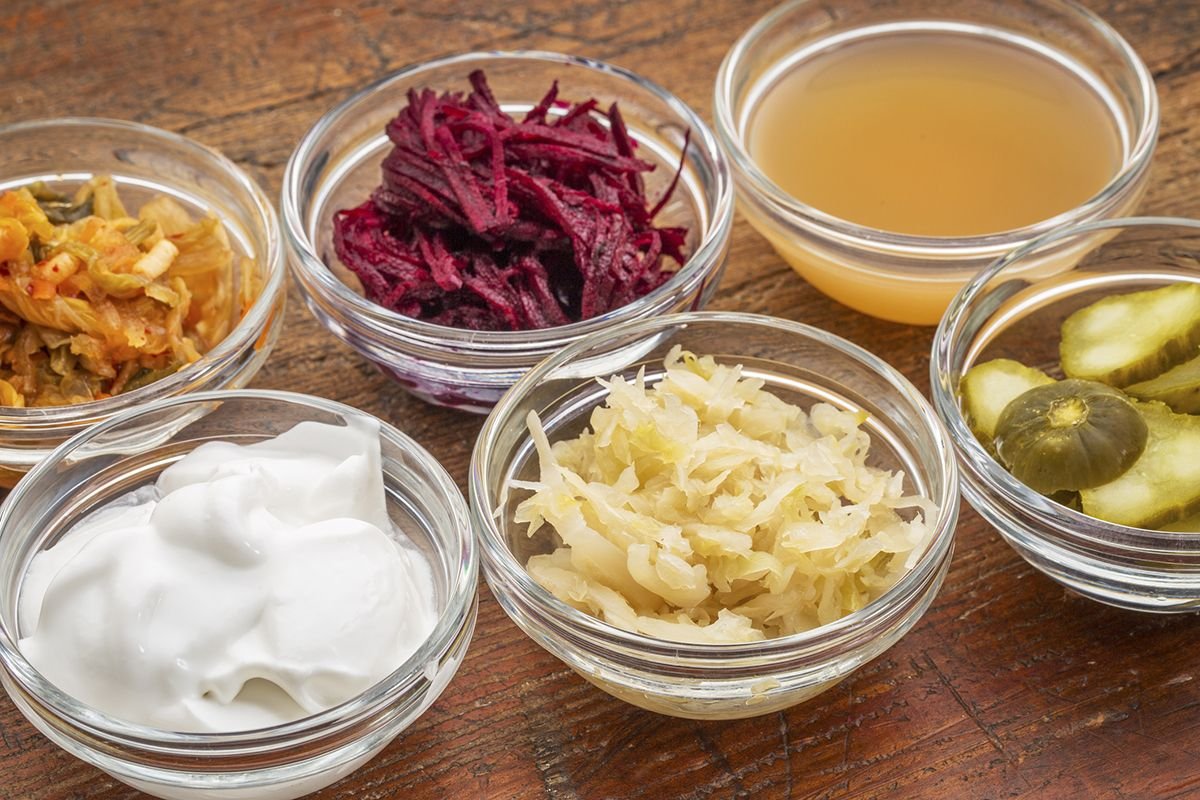Apple cider vinegar is a folk remedy with staying power: As far back as ancient Babylonia, it's been used as a health supplement in addition to in cooking and preserving food. Hippocrates used it to treat more than a dozen different conditions, from ulcers to fractured bones. Medicine has evolved since then, but vinegar evangelists continue to praise it for boosting health, clear skin and weight loss.

These days, apple cider vinegar is part of many celebrity diet regimes—Kourtney Kardashian drinks it daily, while Scarlett Johansson credits it for her flawless skin. A 2018 industry report from QYResearch Group predicted the market for apple cider vinegar, sometimes called ACV, will grow 6.8 percent a year until 2028.
Apple cider vinegar can be purchased filtered or unfiltered. The cloudy, unfiltered product contains something known as "the mother," a colony of bacteria that help the vinegar ferment. Although some manufacturers say the mother has friendly bacteria in it, that claim hasn't been backed up by science. Katherine Kimber, a registered dietitian at Nude Nutrition, remains skeptical of miracle health claims about apple cider vinegar, which range from curing heartburn to lowering cholesterol.
"Some studies suggest promising effects, however, there are many limitations to these, and some risks involved in taking ACV," says Kimber. "The studies to date include very small samples of people, are often just anecdotal reports or are conducted in animals. The data cannot be transferred to humans without more higher quality human studies."
ACV can actually be harmful to people with gastroparesis, high stomach acidity, or who are on medications that lower blood sugar. It can interfere with potassium absorption and with some medications, so check with your doctor before making it a part of any routine.
Although she doesn't recommend it to her clients for health reasons, Kimber says that "for someone that likes ACV and is able to tolerate it, there is nothing wrong with including it as part of a balanced diet."

Kimber says apple cider vinegar does contain healthy minerals—just in tiny concentrations. "It contains very small amounts of potassium, copper and magnesium—minerals help turn the food we eat into energy and support controlling the movement of fluids into and out of cells," she says. "It provides a small amount of amino acids (building blocks for protein) and antioxidants, which help slow the process of cell damage."
Vinegar is acidic, meaning it can erode tooth enamel and cause harm to your digestive system if drunk straight from the bottle, or sipped often throughout the day. Instead, if you want to try it, Healthline recommends diluting a tablespoon in eight ounces of water, and drinking it once or twice a day before a starch-heavy meal.
Although it's not a surefire cure for any ailment, apple cider vinegar does have a lot of uses. These are some of the ways it can be used in your everyday life, from cleaning to haircare.

Can apple cider vinegar lower blood sugar?
If you're trying to keep an eye on your blood sugar, apple cider vinegar could help: The acetic acid in the vinegar, if it's consumed before a meal, can help block the absorption of starch. One study found it helped increase blood flow and balance insulin levels. However, it should be noted that this study, like most on ACV, had a very small sample group. "Before we can say that apple cider vinegar helps with blood sugar control, further and larger studies in different groups of people are required," Kimber cautions.
She also points out the flaws in another study, which asked participants to drink 20ml [4tsp] of apple cider vinegar with a white bagel and orange juice. "They found it reduced the spike in blood sugar after the meal versus the group who did not consume the vinegar with the meal," says Kimber. "However, eating a white bagel and a glass of orange juice is not a fair representation a balanced meal. Adding some veggies and protein to that meal would have the same effect."
Apple cider vinegar and weight loss
Although it's no substitute for exercise and a healthy diet, apple cider vinegar may help you lose weight. A 2009 study of obese people in Japan found that consuming a drink with vinegar mixed in aided in weight loss—the vinegar-drinking participants lost between two and four pounds over 12 weeks.
However, a report in The International Journal of Obesity claimed the vinegar aided weight loss because its astringent taste made participants too nauseous to eat. Another study claimed ACV was helping to make the subjects feel fuller, but Kimber cautions that, "Tricking your body into feeling full does not help nature a good relationship with food or your body. Plus, who wants to drink that at every meal?"
A remedy for problem hair
Although there haven't been many scientific studies on it, apple cider vinegar is also widely used in haircare. Dry, frizzy hair is often caused by alkaline, which can be counteracted by the acidic nature of vinegar, which also helps remove dandruff and product buildup. Best of all, you don't have to drink it: Add one cup of ACV to two cups of water, and apply to your hair after shampooing.

Apple cider vinegar: A natural cleaning product
If you're wary of introducing more chemicals into your home, apple cider vinegar can be a natural alternative to some cleaning products. It works particularly well on alkaline buildups, like soap residue, although it doesn't kill as much bacteria as commercial cleaners (don't mix it with chlorine bleach though, as that produces chlorine gas). It can also be used to kill mold, and deodorize fabrics and appliances.
Add apple cider vinegar to your beauty regime
Some people swear by diluted apple cider vinegar as an acne cure or daily face wash, but it's likely too acidic for most skin types to use regularly. However, its antifungal and antibacterial properties, as well as its ability to reduce acne scarring, make it a great ingredient for an inexpensive homemade face mask to be used occasionally. Mix the vinegar with honey to add a moisturising element, but patch test on your skin beforehand to make sure the concentration doesn't burn.
It can soothe fungal infections
Candida albicans is a common fungal infection, especially prevalent in people with type 2 diabetes. There are reports of oral and vaginal candida that didn't clear up with conventional treatment being eliminated with apple cider vinegar. It's always best to go to a doctor first, but it's worth trying on stubborn cases that medicine seems unable to help with.

Apple cider vinegar is good for your feet
Soaking your feet in diluted apple cider vinegar after a long day isn't just relaxing. It also helps kill bacteria and fungi which have made their home on your feet, which can cause infections and bad odors. It also helps soothe dry skin and cracked heels, making them look, as well as smell, prettier. If you hate the scent of vinegar, you can add a few drops of essential oil to the mix.
It's useful in the kitchen
The most commonly-known use for apple cider vinegar may be as a salad dressing, where it adds a fruity tang. But cider apple vinegar has a myriad of other uses too. It can be used to pickle fruit and vegetables. When added to the water used to poach eggs, it firms up the egg whites to create better results.
Although more studies are needed to confirm the vinegar's use as a dieting aid, it can substitute for less healthy seasonings: Says Kimber, "It's a good way to spice up your meals without adding salt."
Apple cider vinegar: A natural preservative
If you have a vegetable surplus, apple cider vinegar is great for quick, easy, homemade pickles. Fresh carrots, cucumbers and ginger should be placed jars and covered in boiled pickling liquid—a combination of vinegar, water, sugar and salt—and refrigerated. This type of pickle doesn't have the same deep flavor as fermented pickles, but they are delicious and crunchy nonetheless.
Uncommon Knowledge
Newsweek is committed to challenging conventional wisdom and finding connections in the search for common ground.
Newsweek is committed to challenging conventional wisdom and finding connections in the search for common ground.
About the writer
To read how Newsweek uses AI as a newsroom tool, Click here.








